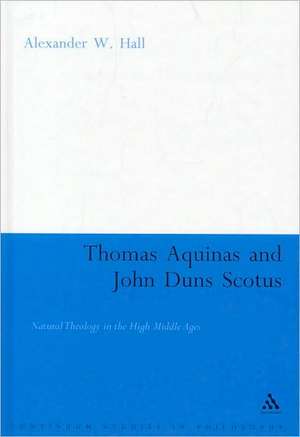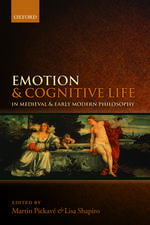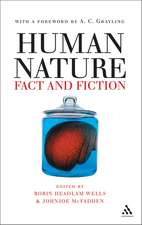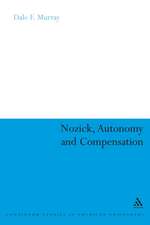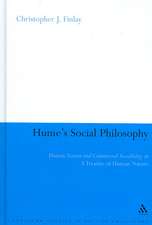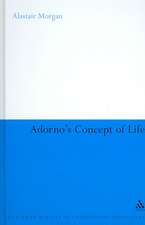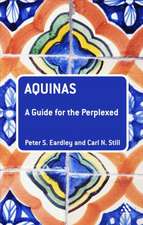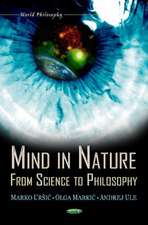Thomas Aquinas & John Duns Scotus: Natural Theology in the High Middle Ages: Continuum Studies in Philosophy
Autor Assistant Professor Alex Hallen Limba Engleză Hardback – 4 feb 2007
Thomas Aquinas and John Duns Scotus are arguably the most celebrated representatives of the 'Golden Age' of scholasticism. Primarily, they are known for their work in natural theology, which seeks to demonstrate tenets of faith without recourse to premises rooted in dogma or revelation.
Scholars of this Golden Age drew on a wealth of tradition, dating back to Plato and Aristotle, and taking in the Arabic and Jewish interpretations of these thinkers, to produce a wide variety of answers to the question 'How much can we learn of God?' Some responded by denying us any positive knowledge of God. Others believed that we have such knowledge, yet debated whether its acquisition requires some action on the part of God in the form of an illumination bestowed on the knower. Scotus and Aquinas belong to the more empirically minded thinkers in this latter group, arguing against a necessary role for illumination.
Many scholars believe that Aquinas and Scotus exhaust the spectrum of answers available to this circle, with Aquinas maintaining that our knowledge is quite confused and Scotus that it is completely accurate. In this study, Alexander Hall argues that the truth about Aquinas and Scotus lies somewhere in the middle.
Hall's book recommends itself to the general reader who is looking for an overview of this period in Western philosophy as well as to the specialist, for no other study on the market addresses this long-standing matter of interpretation in any detail.
Scholars of this Golden Age drew on a wealth of tradition, dating back to Plato and Aristotle, and taking in the Arabic and Jewish interpretations of these thinkers, to produce a wide variety of answers to the question 'How much can we learn of God?' Some responded by denying us any positive knowledge of God. Others believed that we have such knowledge, yet debated whether its acquisition requires some action on the part of God in the form of an illumination bestowed on the knower. Scotus and Aquinas belong to the more empirically minded thinkers in this latter group, arguing against a necessary role for illumination.
Many scholars believe that Aquinas and Scotus exhaust the spectrum of answers available to this circle, with Aquinas maintaining that our knowledge is quite confused and Scotus that it is completely accurate. In this study, Alexander Hall argues that the truth about Aquinas and Scotus lies somewhere in the middle.
Hall's book recommends itself to the general reader who is looking for an overview of this period in Western philosophy as well as to the specialist, for no other study on the market addresses this long-standing matter of interpretation in any detail.
| Toate formatele și edițiile | Preț | Express |
|---|---|---|
| Paperback (1) | 255.66 lei 6-8 săpt. | |
| Bloomsbury Publishing – 15 sep 2009 | 255.66 lei 6-8 săpt. | |
| Hardback (1) | 1006.06 lei 6-8 săpt. | |
| Bloomsbury Publishing – 4 feb 2007 | 1006.06 lei 6-8 săpt. |
Din seria Continuum Studies in Philosophy
-
 Preț: 255.58 lei
Preț: 255.58 lei -
 Preț: 256.59 lei
Preț: 256.59 lei - 22%
 Preț: 256.29 lei
Preț: 256.29 lei - 31%
 Preț: 890.62 lei
Preț: 890.62 lei - 18%
 Preț: 304.66 lei
Preț: 304.66 lei -
 Preț: 254.93 lei
Preț: 254.93 lei - 24%
 Preț: 249.00 lei
Preț: 249.00 lei - 22%
 Preț: 889.49 lei
Preț: 889.49 lei - 31%
 Preț: 890.86 lei
Preț: 890.86 lei - 22%
 Preț: 1064.84 lei
Preț: 1064.84 lei - 31%
 Preț: 947.54 lei
Preț: 947.54 lei - 23%
 Preț: 255.11 lei
Preț: 255.11 lei - 31%
 Preț: 888.74 lei
Preț: 888.74 lei - 31%
 Preț: 890.72 lei
Preț: 890.72 lei - 22%
 Preț: 1005.49 lei
Preț: 1005.49 lei - 22%
 Preț: 946.72 lei
Preț: 946.72 lei -
 Preț: 254.75 lei
Preț: 254.75 lei - 22%
 Preț: 1005.98 lei
Preț: 1005.98 lei -
 Preț: 255.19 lei
Preț: 255.19 lei - 31%
 Preț: 889.15 lei
Preț: 889.15 lei - 22%
 Preț: 889.23 lei
Preț: 889.23 lei - 22%
 Preț: 947.86 lei
Preț: 947.86 lei - 22%
 Preț: 256.49 lei
Preț: 256.49 lei - 31%
 Preț: 888.58 lei
Preț: 888.58 lei - 14%
 Preț: 1006.24 lei
Preț: 1006.24 lei - 31%
 Preț: 891.51 lei
Preț: 891.51 lei - 22%
 Preț: 1005.89 lei
Preț: 1005.89 lei -
 Preț: 256.38 lei
Preț: 256.38 lei - 31%
 Preț: 1152.60 lei
Preț: 1152.60 lei - 23%
 Preț: 255.38 lei
Preț: 255.38 lei - 22%
 Preț: 1006.72 lei
Preț: 1006.72 lei - 31%
 Preț: 946.72 lei
Preț: 946.72 lei - 22%
 Preț: 257.76 lei
Preț: 257.76 lei - 22%
 Preț: 1005.18 lei
Preț: 1005.18 lei -
 Preț: 256.49 lei
Preț: 256.49 lei -
 Preț: 256.38 lei
Preț: 256.38 lei - 31%
 Preț: 1003.53 lei
Preț: 1003.53 lei -
 Preț: 258.42 lei
Preț: 258.42 lei - 19%
 Preț: 464.39 lei
Preț: 464.39 lei - 22%
 Preț: 1005.89 lei
Preț: 1005.89 lei - 22%
 Preț: 1005.56 lei
Preț: 1005.56 lei - 11%
 Preț: 465.66 lei
Preț: 465.66 lei - 22%
 Preț: 1006.62 lei
Preț: 1006.62 lei - 13%
 Preț: 255.66 lei
Preț: 255.66 lei
Preț: 1006.06 lei
Preț vechi: 1451.15 lei
-31% Nou
Puncte Express: 1509
Preț estimativ în valută:
192.53€ • 209.06$ • 161.73£
192.53€ • 209.06$ • 161.73£
Carte tipărită la comandă
Livrare economică 23 aprilie-07 mai
Preluare comenzi: 021 569.72.76
Specificații
ISBN-13: 9780826485892
ISBN-10: 0826485898
Pagini: 192
Dimensiuni: 156 x 234 x 19 mm
Greutate: 0.44 kg
Editura: Bloomsbury Publishing
Colecția Continuum
Seria Continuum Studies in Philosophy
Locul publicării:London, United Kingdom
ISBN-10: 0826485898
Pagini: 192
Dimensiuni: 156 x 234 x 19 mm
Greutate: 0.44 kg
Editura: Bloomsbury Publishing
Colecția Continuum
Seria Continuum Studies in Philosophy
Locul publicării:London, United Kingdom
Caracteristici
The first book ever to focus on a key historical debate over the ability of reason to demonstrate the tenets of faith
Cuprins
List of abbreviations
List of translations
Chapter 1: Introduction
Chapter 2: Aquinas and scientia
Chapter 3: Scientia, analogia, and the Five Ways
Chapter 4: Duns Scotus on naming
Chapter 5: Scotus, divine names, and deliberate equivocity
Chapter 6: Transcendental signification and analogy
Bibliography
Index.
List of translations
Chapter 1: Introduction
Chapter 2: Aquinas and scientia
Chapter 3: Scientia, analogia, and the Five Ways
Chapter 4: Duns Scotus on naming
Chapter 5: Scotus, divine names, and deliberate equivocity
Chapter 6: Transcendental signification and analogy
Bibliography
Index.
Recenzii
Mentioned in The Chronicle of Higher Education, March 23, 2007. Volume LIII, No. 29.
"In teasing out the hermeneutical and speculative differences between Aquinas and Scotus, Hall sharpens our view of the similarities between them. He also persuasively advances a more nuanced understanding of the questions driving natural theology at the height of the Middle Ages...Thomistic scholars will be particularly interested in Chapter 2 of Hall's book, for it contains a highly synthetic, ad litteram exposition of Aquinas' interpretation of Aristotle's theory of predication. Hall includes a synoptic comparison of the respective Greek and Latin texts without burdening the readers with excessive lexicographical information. Overall, speculative issues remain at the forefront of Hall's discussion so that philosophers can engage the arguments on their own turf." -Daniel B. Gallagher, Philosophy in Review
"Hall's discussion of...Scotus's account of God and religious language is the best such account known to me...Hall offers a valuable and innovative account of the relations between Aquinas and Scotus on these questions..." British Journal for the History of Philosophy, 2008
"Aquinas's account of per se belonging, the scientific syllogism, and the types of scientific demonstration are rough going for the non-specialist reader, but Hall does his best to make them accessible. These are crucial discussions for his purposes, because in chapter 3 he proceeds on the assumption that Aquinas intends the Five Ways as paradigmatic cases of scientific demonstration...to make his [Hall's] case that the First Way is a paradigmatic instance of scientific demonstration, Hall needs to show that "The ultimate cause of motion exists" is itself the conclusion of a paradigmatic scientific syllogism. But Hall's interests lie elsewhere. He focuses instead on how 'exists' is predicated analogically in the major premise and conclusion...Accordingly, Hall tries to show for each of the Five Ways how Aquinas's use of analogy enables him to attain scientia of a being that is radically different from the creaturely effects to which he appeals for the starting-points of each proof." - Thomas Williams, Journal of the History of Philosophy, July 2008
"In teasing out the hermeneutical and speculative differences between Aquinas and Scotus, Hall sharpens our view of the similarities between them. He also persuasively advances a more nuanced understanding of the questions driving natural theology at the height of the Middle Ages...Thomistic scholars will be particularly interested in Chapter 2 of Hall's book, for it contains a highly synthetic, ad litteram exposition of Aquinas' interpretation of Aristotle's theory of predication. Hall includes a synoptic comparison of the respective Greek and Latin texts without burdening the readers with excessive lexicographical information. Overall, speculative issues remain at the forefront of Hall's discussion so that philosophers can engage the arguments on their own turf." -Daniel B. Gallagher, Philosophy in Review
"Hall's discussion of...Scotus's account of God and religious language is the best such account known to me...Hall offers a valuable and innovative account of the relations between Aquinas and Scotus on these questions..." British Journal for the History of Philosophy, 2008
"Aquinas's account of per se belonging, the scientific syllogism, and the types of scientific demonstration are rough going for the non-specialist reader, but Hall does his best to make them accessible. These are crucial discussions for his purposes, because in chapter 3 he proceeds on the assumption that Aquinas intends the Five Ways as paradigmatic cases of scientific demonstration...to make his [Hall's] case that the First Way is a paradigmatic instance of scientific demonstration, Hall needs to show that "The ultimate cause of motion exists" is itself the conclusion of a paradigmatic scientific syllogism. But Hall's interests lie elsewhere. He focuses instead on how 'exists' is predicated analogically in the major premise and conclusion...Accordingly, Hall tries to show for each of the Five Ways how Aquinas's use of analogy enables him to attain scientia of a being that is radically different from the creaturely effects to which he appeals for the starting-points of each proof." - Thomas Williams, Journal of the History of Philosophy, July 2008
